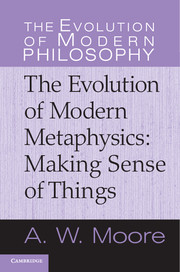Book contents
- Frontmatter
- Contents
- Preface
- Introduction
- Part One The Early Modern Period
- Part Two The Late Modern Period I
- Part Three The Late Modern Period II
- Chapter 15 Nietzsche
- Chapter 16 Bergson
- Chapter 17 Husserl
- Chapter 18 Heidegger
- Chapter 19 Collingwood
- Chapter 20 Derrida
- Chapter 21 Deleuze
- Conclusion
- Bibliography
- Index
Chapter 16 - Bergson
Metaphysics as Pure Creativity
from Part Three - The Late Modern Period II
Published online by Cambridge University Press: 05 June 2012
- Frontmatter
- Contents
- Preface
- Introduction
- Part One The Early Modern Period
- Part Two The Late Modern Period I
- Part Three The Late Modern Period II
- Chapter 15 Nietzsche
- Chapter 16 Bergson
- Chapter 17 Husserl
- Chapter 18 Heidegger
- Chapter 19 Collingwood
- Chapter 20 Derrida
- Chapter 21 Deleuze
- Conclusion
- Bibliography
- Index
Summary
Introduction
Many of our protagonists have distinguished, if only implicitly, between two or more kinds of sense-making, in a way that has critically shaped their contribution to the saga. Thus we have witnessed:
Spinoza’s distinction between his three kinds of knowledge
Kant’s broad distinction between what I called ‘thick’ sense-making and ‘thin’ sense-making
Hegel’s distinction between operations of understanding and operations of reason
the early Wittgenstein’s distinction between propositional sense-making and non-propositional sense-making
the two variations on that theme in the later Wittgenstein and Dummett
and
Carnap’s distinction between the making of judgments within a linguistic framework and the adoption of the framework.
- Type
- Chapter
- Information
- The Evolution of Modern MetaphysicsMaking Sense of Things, pp. 406 - 428Publisher: Cambridge University PressPrint publication year: 2011

